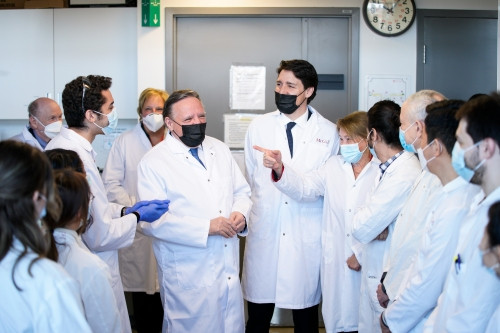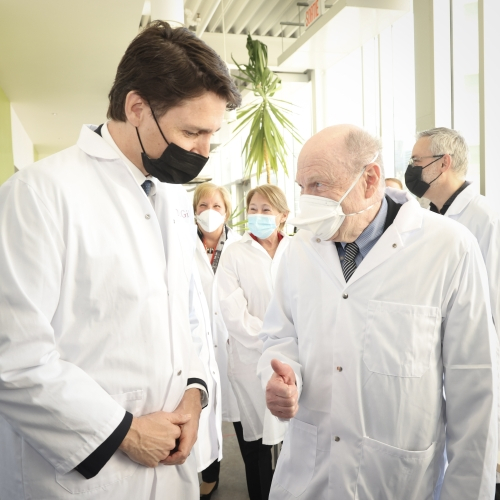On the morning of Friday, April 29, 2022, Prime Minister Justin Trudeau and Quebec Premier François Legault joined Principal Suzanne Fortier in the lobby of the Bellini Building on McGill’s downtown campus to make a historic announcement: U.S.-based COVID-19 vaccine developer Moderna will build a state-of-the-art manufacturing facility in the Montreal area to produce made-in-Canada messenger RNA (mRNA) vaccines, as well as vaccines for influenzas and other illnesses.
Legacy of RNA research at McGill and the Goodman Cancer Institute
Prior to the announcement, Principal Fortier and Vice-Principal, Research and Innovation, Martha Crago, joined the Prime Minister and the Premier on a tour of McGill Professor Nahum Sonenberg's research lab. Sonenberg and others at McGill are part of a rich history of mRNA innovation. In 2014, Sonenberg received the Wolf Prize in Medicine for essential discoveries about mRNA translation, the underlying principles of which enable the COVID-19 mRNA vaccine to be translated to the Spike protein that our immune system recognizes. McGill professor Thomas Duchaine has also made significant research contributions, uncovering the role of microRNAs, knowledge harnessed in drugs undergoing clinical trials to treat cancers, neurodegenerative diseases and genetic disorders. McGill professor Jerry Pelletier's research has transformed understanding on the structural determinants of mRNA stability and translatability. These advances contributed to Moderna’s ability to use mRNA in COVID-19 vaccines and future RNA therapies.
McGill and the future of mRNA in Canada
McGill University is Canada’s leading engine for the development and testing of new RNA-based therapies and, through deep collaborations with industry and government, is helping translate these discoveries into new, approved, and widely available drugs. More than 100 internationally recognized scientists whose research focuses directly on genomics and RNA investigation as well as many more whose work in bioethics, policy, engineering and biomanufacturing, biochemistry, bioinformatics, AI and machine learning, clinical medicine and more can amplify our contributions. McGill has long been a leader in the areas of RNA and genomics research, as measured by peer-reviewed publications, external funding, and other core metrics of influence and success.
In addition, we harness this comprehensive expertise through the McGill Genome Centre and the McGill Research Centre on Complex Traits. Well-established groups and dedicated bioprocessing facilities in the Departments of Biomedical Engineering, Bioengineering, and Chemical Engineering also ensure the capacity to produce and test new drugs. Finally, groups including the Centre for Genomics and Policy as well as McGill's International Research Infrastructure on Social Inequalities in Health bring an essential ethical and policy perspective to our work.
The university recently joined Moderna’s mRNA Access program, which aims to accelerate innovation and enable new vaccines and medicines for emerging and neglected infectious diseases through collaborative research and preclinical development. We were the first university in Canada to join this program as it ramps up its international rollout.


